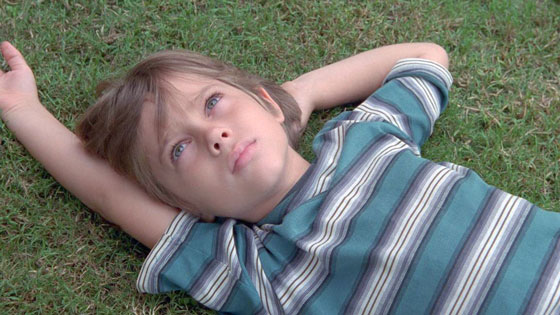I followed the production of Boyhood for about six of its twelve-year history. Director Richard Linklater embarked on this incredibly long production process to follow the real-life aging of boy actor Ellar Coltrane for this fiction film about childhood. Despite this extreme attempt at finding authenticity, I found much of Boyhood put on and staged. The acting is unimpressive, often feeling unnatural, and the writing is frustratingly on the nose. The classic moments of childhood are covered but in a way that evoked the classic notion of those moments, not the specific way that an actual human being encounters them in real life. That said, it’s not all artificial.
There are moments of Boyhood that are pure magic; the moments that make us fall in love with cinema. Near the beginning of the film, Coltrane’s character Mason must paint over his and his sister’s height marks on the wall of their home as they must move elsewhere. The camera sits on Mason’s hesitant brush strokes that illustrate their family’s presence being erased as they move on to another town. I cried. Later, Mason and his sister must listen to their mother and her boyfriend scream at one another. Anyone who has experienced the shock of such a moment will be shaken, brought back to notions of inadequacy wondering: “Is it my fault?” Another striking moment is when Mason and his sister come home to a confrontation between their mother and her current husband. Domestic abuse has occurred, and the ensuing family dinner is brimming with tension.
However, these moments of magic are too few and far between. Their sincerity is interrupted by an over-reliance on tired tropes like the previously mentioned falsely classic moments, music that awkwardly attempts to evoke the time period, and one atrocious and unforgivably bad plotline involving a Hispanic male (you’ll understand what I mean if you see the film, while squirming in your chair). At first, I did my best to give my heart to the moments in Boyhood, to find myself in them, but at a certain point I had nothing left to give; characters don’t have to be typical to be relatable. This is a very good movie, but the flaws are too gaping to be forgiven.
Grade: B

 RSS Feed
RSS Feed
